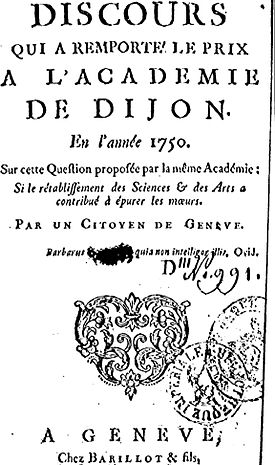- Discourse on the Arts and Sciences
-

Original editionAuthor(s) Jean-Jacques Rousseau Original title Discours sur les sciences et les arts Country France Language French Publisher Geneva, Barillot & fils [i. e. Paris, Noël-Jacques Pissot] Publication date 1750 Published in
EnglishLondon, W. Owen, 1751 A Discourse on the Moral Effects of the Arts and Sciences (1750), more commonly known as Discourse on the Sciences and Arts (French: Discours sur les sciences et les arts), is an essay by Genevan philosopher Jean-Jacques Rousseau which argued that the arts and sciences corrupt human morality. It was Rousseau's first successful published philosophical work, and it was the first expression of his influential views about nature vs. society, to which he would dedicate the rest of his intellectual life. This work is considered one of his most important works.
Rousseau wrote Discourse in response to an advertisement that appeared in a 1749 issue of Mercure de France, in which the Academy of Dijon set a prize for an essay responding to the question: "Has the restoration of the sciences and the arts contributed to refining moral character?" According to Rousseau, "Within an instant of reading this [advertisement], I saw another universe and became another man." Rousseau found the idea to which he would passionately dedicate the rest of his intellectual life: the destructive influence of civilization on human beings. Rousseau went on to win first prize in the contest in July 1750 and—in an otherwise mediocre career as composer and playwright, among other things—he had new found fame as a philosopher.
Rousseau's argument was controversial, and drew a great number of responses. One from critic Jules Lemaître calling the instant deification of Rousseau as 'one of the strongest proofs of human stupidity.' Rousseau himself answered five of his critics in the two years or so after he won the prize. Among these five answers were replies to Stanisław Leszczyński, King of Poland, M. l'Abbe Raynal, and the "Last Reply" to M. Charles Bordes. These responses provide clarification for Rousseau's argument in the Discourse, and begin to develop a theme he further advances in the Discourse on Inequality – that misuse of the arts and sciences is one case of a larger theme, that man, by nature good, is corrupted by civilization. Inequality, luxury, and the political life are identified as especially harmful.
Rousseau's own assessment of the essay was ambiguous. In one letter he described it as one of his "principal writings," and one of only three in which his philosophical system is developed (the others being the Discourse on Inequality and Emile), but in another instance he evaluated it as "at best mediocre."[1]
References
- Blair Campbell. "Montaigne and Rousseau's First Discourse." The Western Political Quarterly, Vol. 28, No. 1. (Mar., 1975), pp. 7-31.
- Jean-Jacques Rousseau. The Social Contract and Discourses. Trans. G.D.H. Cole. London: Everyman, 1993. Introduction referenced for general background.
Notes
- ^ Campbell (1975), 9.
External links
- Discourse on the Arts and Sciences, full text in HTML format, at the Online Library of Liberty.
Categories:- Essays
- 1750 books
- Works by Jean-Jacques Rousseau
Wikimedia Foundation. 2010.
